Pitfalls of using electric boilers for heating: what's the catch?
You are viewing the section Electric boilers, located in the large section Boilers.
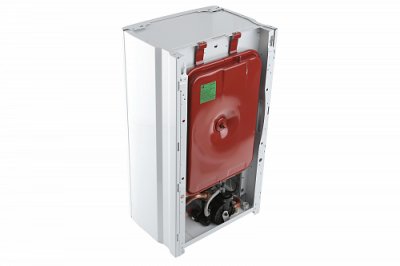
Typically, apartments are connected to central heating, and home owners heat their homes with boilers. on solid fuel or gas. But this is not always possible.
In such cases, electric boilers are used for the heating and hot water supply system.
This device is perfect for the described needs, working by converting electrical energy into heat.
Content
How an electric heating boiler works
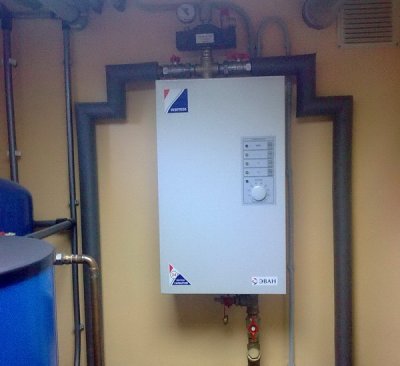
On the front panel of the case are located mechanical or digital controls boiler.
With their help you can set the desired temperature coolant and regulate the boiler power.
Some models with digital control are equipped with programmer, which is designed to set the time for switching on the electric boiler.
In other models, this is achieved using an additional device that is not included in the kit.
Under the cover of the electric boiler body is located tank heating of the coolant, and in some models circulation pump. Water enters the tank, heats up and has a user-set temperature at the outlet. There are several ways to heat the coolant, using electricity, let's look at them in more detail.
Important! There are models for sale for both single-phase, and for three-phase electrical network.
If the electric boiler does not have a built-in circulation pump, it must be installed separately. It carries out coolant movement, and without it the heating system will not work.
Heating by induction
It is installed in the metal heat exchanger body hollow copper core, with a thread wound around it coil. When voltage is applied, an electromagnetic field is generated. Due to it, between the body and the core, eddy currents that heat the metal. The coolant flowing inside the electric boiler core heats up and transfers heat to the system. This has a number of advantages.
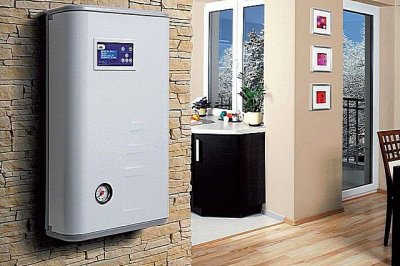
- Inside the heat exchanger there is practically no scale formation.
- Efficiency induction boilers are approaching To 100%.
- Reduced to minimum number of connections. This significantly reduces the possibility of coolant leakage.
- Thanks to this method of heating, not only water acts as a heat carrier, but also almost any liquid: antifreeze, transformer oil, antifreeze and others.
- Declared service life more than 30 years.
There are also flaws. High cost and heavy weight of the device. Power regulation is stepped, not smooth. This means that it is impossible to set the temperature precisely.
Important! If there is an oil leak from the system, this may happen fire!
Good old heating element
Here, electric current is not directly involved in heating the water. It is supplied to the heating element. Inside is located a coil made of a material with high resistance, it is this that heats up when current is supplied.
Then the heat is transferred filler, with high thermal conductivity, then heating element body. The metal shell of the heating element increases the temperature of the coolant. Such devices have both advantages and disadvantages.
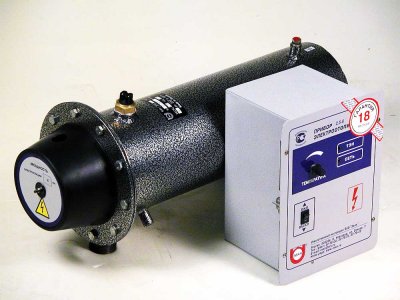
- The cheapest models boilers are equipped with a heating element.
- Electronics allows regulate temperature smoothly and precisely water.
- Minimum cost of repairs compared to other heating methods.
- Inside such boilers a circulation pump is always installed and often has a built-in programmer.
Many positive qualities, but also disadvantages quite a lot.
- Over time, a layer of carbon forms on the heating element. scale, which reduces the performance of the electric boiler and then leads to breakdown.
- It is used as a coolant only water or special liquids, glycol based.
- Even if the electric boiler is regularly descaled, the heater will burn out without working and 10 years (natural wear and tear).
- In case of a malfunction of the overheating sensor, starting the device without coolant, or its leakage during operation, will cause breakdown Heating element due to overheating.
Electrode method
These devices are also called electrolytic or ionic. The principle of operation of the ion boiler is to heat the coolant by excitation of sodium salt ionsIn this case, water acts as an element of an electrical circuit.
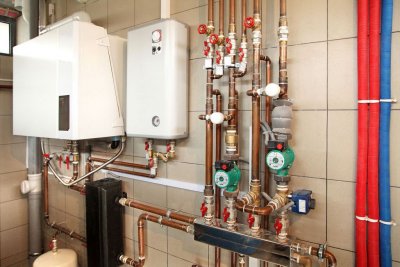
A pair of electrodes is lowered into the heat exchanger, to which a high-frequency electric current is supplied.
Passing through water, from electrode to electrode, the current affects impurity ions, causing the coolant to heat up.
The peculiarity of such devices is slow temperature change water. This is due to the fact that the adjustment occurs due to the increase or decrease in the electrical resistance of the liquid, by adjusting the distance between the electrodes. Now let's consider the pros and cons of the system.
- The dimensions and weight of ion boilers are significantly smaller, compared to other types of heaters.
- Reliable protection system, from short circuit.
- The efficiency of such devices close to 95%.
- Low cost.
As for disadvantages, then there are few of them, only one. The coolant in the system must meet fairly strict requirements. It must be water or a special liquid that at a temperature of 20 degrees provides electrical resistance 1500 Ohm*cm. The adjustment is made by adding salt (to increase resistance) or soda (to decrease resistance) to the water.
What is good about an electric boiler?
Having studied the intricacies of the internal structure of an electric boiler, it is time to move on to positive aspects its use.
Minimal risks of use
Electric devices have a high degree of safety. Such a boiler will not burn the user with flame or shock. It does not burn out the oxygen in the room, does not emit carbon monoxide. In general, it does not affect human health in any way.
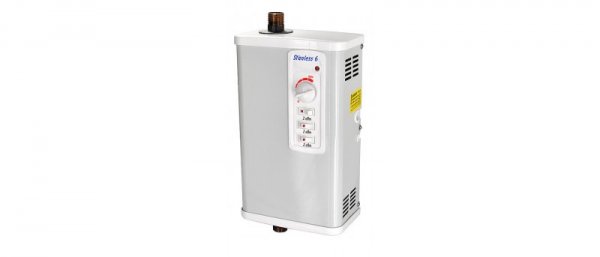
Photo 1. Electric boiler model EVP-6m, 11 kg, 220 V, manufacturer - "Stanless".
No noise
The noisiest part of an electric boiler is the circulation pump. But it is only capable of “producing” less than 50 dB. This means that even at night the device will not disturb the owner sleeping in the same room.
Not only heating, but also hot water supply
Electric boilers are also produced in a double-circuit design. Which will allow the user not only to heat the room, but also to organize their own hot water supply. Moreover, the ease of control of the electric boiler allows disabling of unused circuit in the warm season. This means that the electric boiler can be used as an autonomous DHW system, without unnecessary energy costs.
No fuel
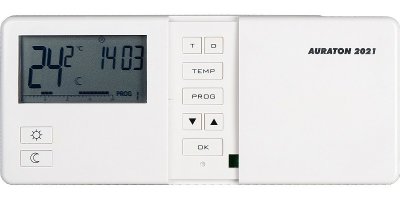
Electric boilers, unlike gas and solid fuel boilers, no need for additional space for fuel storage.
There is no need to equip a special room for an electric boiler and maintain certain conditions in it for storing cylinders with liquefied gas or coal.
Caring for the environment
Gas and solid fuel boilers emit combustion products into the atmosphere during operation. Electric devices are completely free of this drawback. During operation, they only emit convert one type of energy into another without releasing harmful substances.
Cons
Unfortunately, even the most advanced mechanisms have their drawbacks.
Where to get so much electricity?
For every house or apartment there is limitation in current consumption. In buildings 80s limitation in 1.5-2 kW, in new houses 3-4 kW. The power consumption of modern electric boilers varies from 3.5 to 100 kW.
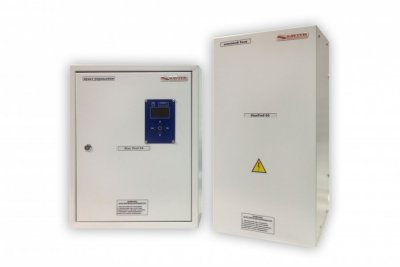
Naturally, the power allocated to the premises will have to be increased, because, in addition to the electric boiler, other equipment is also operating in the house. For this, it will be necessary contact the city power grid.
If there is a possibility, the capacity will be increased free of charge. Otherwise, a new electrical wiring project will have to be prepared, which will require large financial investments.
Increase in power up to 15 kW - 70 thousand rubles, each additional kW from above is another 10 thousand rubles.
This kind of heating costs a pretty penny
Let's assume that there is an electric boiler installed in the house, with a power of 5 kW. To maintain the temperature of the coolant, with good thermal insulation of the room, it will consume half of its power, 2.5 kW h. When switched on, the heating element is approximately 12 hours. It turns out that an electric boiler will consume per day 30 kW h. If we take the cost kW/h equal to 5.38 rubles., it turns out that day of work the boiler will do in 161.4 rub.
The heating season in Russia lasts from October 15 to April 15, 180 days. Let's multiply the number of days by the cost of one day of operation of an electric boiler. We get that during the heating season we will have to spend 13068 rub. And this is only if the boiler power is selected correctly.
There is no way without a socket
Another drawback is - energy dependence. If the electricity in the house is turned off for a long time, this will negatively affect not only the temperature in the room. The coolant frozen in the heating system can split the pipes or damage the electric boiler itself.
It is important to know: the main characteristics
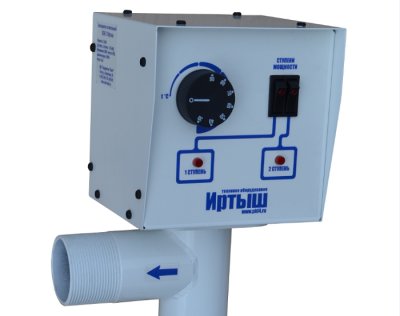
The electric boiler has two key characteristics: power and type of heating element. Why is power so important?
If it is not enough, the device will either not be able to maintain the desired temperature or will work continuously. In order to avoid problems, you need to choose an electric boiler based on the following data.
For heating 10 sq. m. area, with ceiling height less than three meters, required 1 kW of energy. If the room has poor thermal insulation, it is better to have a couple of kW in reserve.
The type of heating element is also important. In an apartment where the type of coolant is not important, cheap electric boilers with a heating element are installed. But for rooms with low thermal insulation, this option is not suitable. Here, an inductive model that can work with antifreeze is required.
Useful video
Watch the video to learn how to choose an electric boiler.
Finally, about electric heating boilers
Electric type devices are quite capable of handling both heating and hot water supply. But due to large monetary costs During the cold season, electric boilers are used more often as a temporary or additional measure.
The main precaution is to watch for leaks of flammable coolants such as oil. Ignoring such a problem can lead to a fire.












